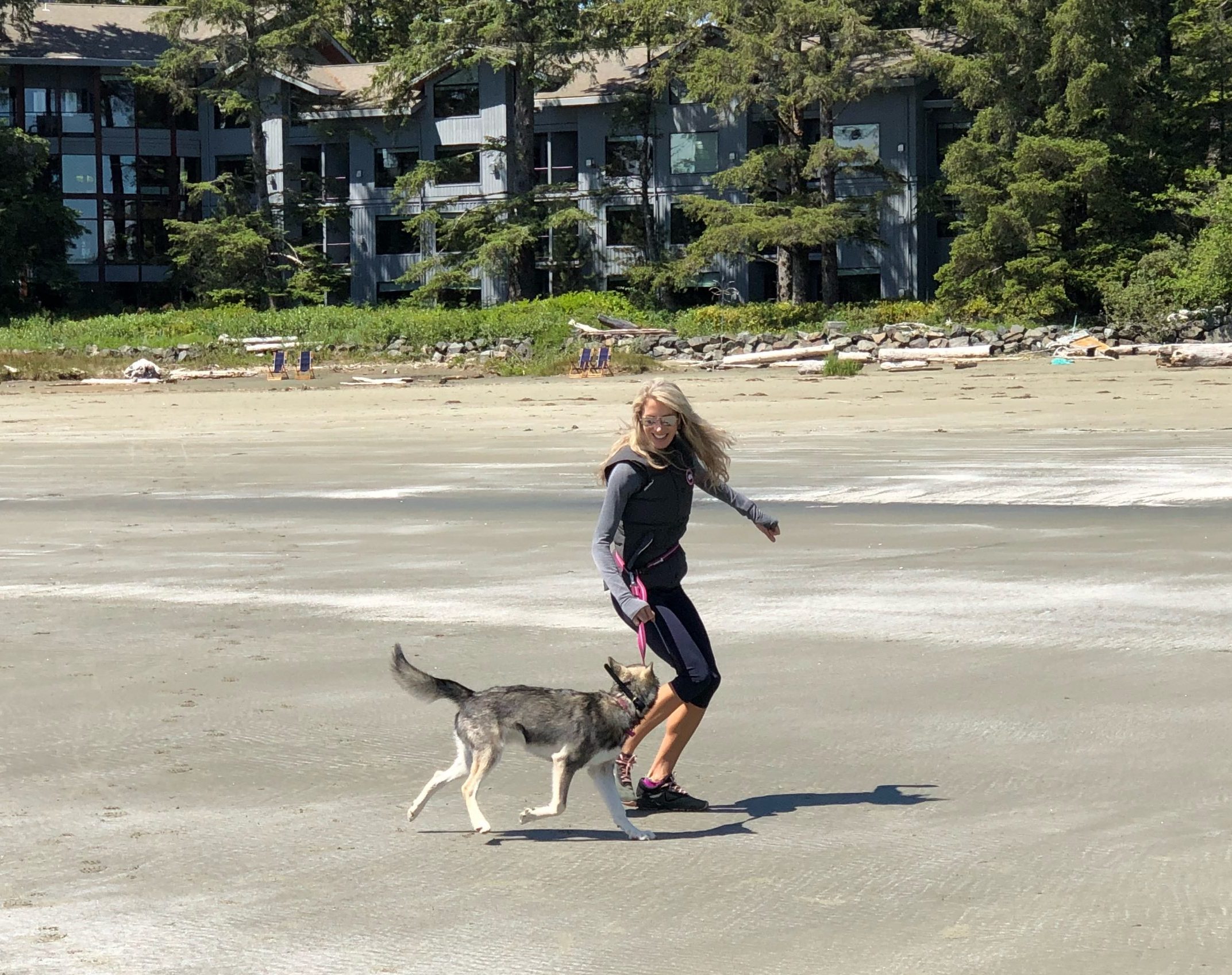Given how cathartic it was to write this article, let’s lead it as the therapy session it is. On that note:
Hi. My name is Christy, and I’m a 40-something-year-old marathon runner, lawyer, businessperson and mother of wolves, with a general aversion to moderation. Also, I travel through my days with my constant companion, Disordered Eating. (We’ll call said companion “ED”, for ease of reference.) What is Disordered Eating, you wonder? It’s a term used for a wide range of unhealthy eating behaviours and worries about body image, including extreme control and rigid routines surrounding food and exercise. It’s complicated, addictive, and all-consuming, and oddly enough, something I am quite good at.
In reading through that introduction, I really shouldn’t be surprised that a person who prides themself on achievement, in all forms, would suffer from (excel at?) a mental illness. The very traits that allowed me to pursue a career in law, a 37+ year running career and the list of assorted achievements outside of that, are the very traits that make me an excellent exercise addict, and a top-notch super-controller of food. All or nothing. Moderation is for wimps. If something is worth doing, it's worth overdoing. Balance is sacrificed for winning.
I maintained that attitude, and that level of control, for a very long time. Seemingly without consequence. And then in recent years, the game changed.
How many articles have you read, wherein the subject female, typically in her 40s, professes that she finally feels comfortable in her skin? How she’s learned, after decades of disordered eating and succumbing to societal pressures and standards, to champion a “f*#k it” attitude, to embrace her imperfections and flaunt her indifference towards the judgments of the world. She has finally found her peace. She no longer cares what other people think about her external shell, she is more than a body, and she floats atop a podium as a respected example for women of all ages. She did it. She shook off the ED! And now she’s content, at peace, and even “normal”! Time to run out and buy a coffee mug or sweatshirt that boasts “#blessed”!
Call me cynical, but I don’t buy it: the articles and showcases of acceptance and “body freedom”, along with the still-airbrushed and delicately posed Instagram posts – I call foul on all of them. Arguably that’s not cynicism as much as it’s personal projection. Regardless, reading those articles and seeing those photos doesn’t help me, and I question whether it helps anyone at any stage of their walk with the ED. In fact those articles make me feel that not only are we fighting to manage something that one arguably cannot be healed from, but we’re now faced with pressure to overcome the ED, triumphantly, publicly, and to showcase our triumph in a “flaws-out” display to the world.
The truth is that I’m not there. And for all those who may think that I’ve got it all figured out, please know that I am exceptionally good at faking it. Given my researched position that the mental illness leading to the ED is something to be managed and not healed from, that means I’ve spent a whole lot of time and energy faking it. And I’m tired.
I keep waiting to become the mature grownup who not only knows better (because I DO know better), but who actually does better. Why am I still struggling with the ED into my 40s? (And just the fact that I more often refer to it as “disordered eating” instead of the ED should reveal a good portion of my mindset.) Shouldn't this get easier? Those 40-something-year-old women in the articles who parade their comfort with their bodies after years of self-loathing, are they lying? Why aren't I there yet? Why aren’t so many other objectively educated people in my circle also not there yet?
Since the ED and my running career have been intertwined throughout my entire life, I can’t help but draw parallels between where I am with my running and where I am with the ED. While I haven’t fully accepted that this includes me yet, I do acknowledge that the concept of age-grading will eventually apply to my running achievements. The technical definition of age-grading is “…the statistical attempt to measure the relative strength of a performance for an athlete of a given age.” So in concept we’ll go from achieving those coveted PBs to racking up age-graded personal bests. In reality, such an application of statistical analysis brings back terrible memories of the dreaded bell curve grading in law school; and at best I see it as a way to cushion the blow that is the inevitable slowing down of the aging body.
I wonder, then, if I should be applying this same age-grading concept to the ED. If my running performance will be changing in step with the natural progression of aging, then perhaps these most recent struggles with the ED aren’t a resurgence of the illness, but instead represent a new phase in the journey with something that was never going to retreat from my life completely. Perhaps it’s as simple as the same ED presenting much differently in our 40s than it did in our 20s and 30s – age-grading for mental illness? Is that a thing?
Let’s explore this concept: They said our bodies would change. Time, gravity, stress, and hormones naturally do that, they say. I’m not entirely sure which experts comprise the collective “they”, but I do know that “they” rarely induce the warm fuzzies. I’ve relied upon my familiar shell, and from that I’ve accumulated a large inventory of cause-and-effect scenarios, and a litany of patterned behaviours. I’m not embarrassed to admit that I have taken much comfort and solace in the familiar patterns, triggers and textbook-like behaviours that I’ve come to recognize as being manifestations of the ED.
For many years, I felt I was objectively successful at managing the ED. It didn’t seem to control my life in my 30s as it did through my teens and throughout my 20s, and this was evidenced by the energy that I redirected away from food and hyper-controlling everything within my sphere, towards school, running, relationships, and generally having a life. I was running fast, I was generally injury-free, and my body was strong and resilient.
What I’m realizing, however, is those patterns, triggers and textbook-like behaviours associated with the ED, that I rightly or wrongly took much solace in, are changing as I progress through my 40s. Combined with my changing body and unfamiliar hormonal and health adjustments, it seems I’m playing in a game in which the goalposts are naturally moving. The same training, the same coping mechanisms and the same patterns are no longer producing the same results. Most notably: I’m not running fast, I’ve been in an injury cycle for nearly three years, and my body is breaking down. Clearly what once elevated me to greatness no longer serves me. This is wildly unsettling, to say the least, and the resulting physical and emotional discomfort with my new reality has forced me to revisit my path forward.
I acknowledge that this personal therapy session has presented more questions and general musings than solutions, which means it’s an accurate reflection of where I’m currently at. It also serves as a reminder of one of my favourite running – and general life – mantras: be comfortable with being uncomfortable. The answers will come, and often they’re already there, a few feet below the surface. With discomfort comes growth; and while I’m not a big fan of change, it’s a necessary byproduct of evolution.
I’ve learned that I can’t get too comfortable with the ED. It won’t always manifest the same way, and it will often require me to check in with myself at different phases and stages of my life. Each phase comes with different challenges, different influencing factors. Different problems and different solutions. My relationship with running and its cross-over with the ED cannot escape the application of the problem and solution lens, which means I will have to address the hard question of whether my running is a hindrance or a help.
Is running part of the solution or part of the problem? Can I figure out how to age-grade the ED before I have to start age-grading my running performances? When I hit my marathon PB in London at age 39, I felt like I had more left in me. Despite the wheels falling off the performance train shortly thereafter, I can’t help but feel flashes of that same inspiration from time to time. What I’ve finally come to realize, however, is that if I do get back there, I will have to take a different path. And that path will force me to take “being comfortable with being uncomfortable” to a whole new level. It will force me to question on the daily whether I’m favouring rigid routines and control over performance. Calories over turnover. Carbs over race medals and PBs. At the end of the day, however, is anyone really keeping score? Who are we kidding – I am. And whether I like it or not, I always will be.
- Christy Lovig



